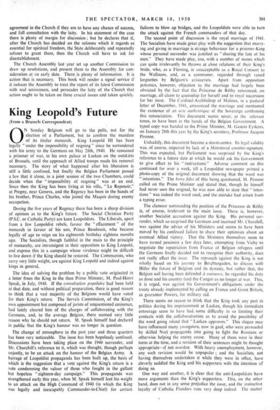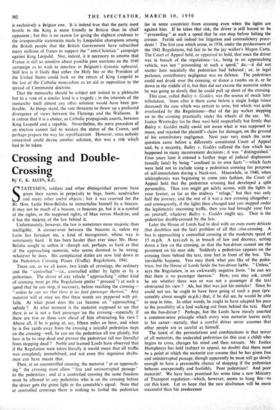King Leopold's Future
(From a Brussels Correspondent) 0 N Sunday Belgium will go to the polls, not for the election of a Parliament, but to confirm the mandate of its titular monarch. King Leopold III has been legally "under the impossibility of reigning " since he surrendered with his army to the Germans on May 28th, 1940. He remained a prisoner of war, in his own palace at Laeken on the outskirts of Brussels, until the approach of Allied troops made his removal necessary. The story of what happened after his liberation is still a little confused, but finally the Belgian Parliament passed a law that it alone, in a joint session of the two Chambers, could decide when the, "impossibility of reigning" was at an end. Since then the King has been living at his villa, "Le Reposoir," at Pregny, near Geneva, and the Regency has been in the hands of his brother, Prince Charles, who joined the Maquis during enemy occupation.
During the five years of Regency there has been a sharp division of opinion as to the King's future. The Social Christian Party (P.S.C. or Catholic Party) are keen Leopoldists. The Liberals, apart from a few Leopoldist rebels, favour the " effacement " of the monarch in favour of his son, Prince Baudouin, who became legally of age to reign on his eighteenth birthday eighteen months ago. The Socialists, though faithful in the main to the principle of monarchy, are intransigent in their opposition to King Leopold, and express this in a campaign whose virulence might be difficult to live down if the King should be restored. The Communists, who carry very little weight, are against King Leopold and indeed against kings in general .
The idea of solving the problem by a public vote originated in a letter from the King to the then Prime Minister, M. Paul-Henri Spaak, in July, 1948. If the consultation populaire had been held at that date, and without political preparation, there is good reason to think that a vast majority of the Belgians would have voted for their King's return. The Servais Commission, of the King's own appointment but composed of jurists of unquestioned eminence, had lately cleared him of the charges of collaborating with the Germans, and, to the average Belgian, there seemed very little reason why he should not return. M. Spaak himself had declared in public, that the King's honour was no longer in question.
The change of atmosphere in the past year and three quarters has been very noticeable. The issue has been hopelessly confused. Discussions have been taking place on the 1940 surrender, and Mr. Churchill's reference to it, which was thought, Though perhaps unjustly, to be an attack on the honour of the Belgian Army. A barrage of Leopoldist propaganda has been built up, the basis of which is the suggestion that a vote against the King's return is a vote condemning the valour of those who fought in the gallant but hopeless "eighteen-day campaign." This propaganda was strengthened early this year, when M. Spaak himself lent his weight to an attack on the High Command of 1940 (in which the King was legally and inescapably Commander-in-Chief) for certain failures to blow up bridges, and the Leopoldists were able to turn the attack against the French commanders of that day.
The second point of discussion is the royal marriage of 1941. The Socialists have made great play with the suggestion that marry- ing and giving in marriage is strange behaviour for a prisoner-King whose personal surrender was justified as "sharing the fate of his men." They have made play, too, with a number of stones which can quite irrelevantly be thrown at close relations of their King's bride, who, as a Fleming, is unacceptable as a Royal Consort to the Walloons, and, as a commoner, regarded through raised lorgnettes by Belgium's aristocrats. Apart from opposition polemics, however, objection to the marriage had largely been obviated by the fact that the Iirincesse de Rdthy renounced, on marriage, all claim to queenship for herself and to royal succession for her issue. The Cardinal-Archbishop of Malines, in a pastoral letter of December, 1941, announced the marriage and mentioned the existence of an acte authentique of the Sovereign confirming this renunciation. This document seems never, at the relevant times, to have been in the hands of the Belgian Government. A typed copy was handed to the Prime Minister, M. Gaston Eyskens, on January 28th this year by the King's secretary, Professor Jacques Pirenne.
Unluckily, this document became a storm-centre. Its legal validity was, of course, impaired by lack of a Ministerial counter-signature. This was expected, but Parliament was surprised by the King's reference to a future date at which he would ask his Government to give effect to his "instructions." Adverse comment on this continued for over a week, till a Leopoldist newspaper printed a photo-copy of the original document showing that the word was "intentions." The bona fides of this being questioned, M. Pirenne called on the Prime Minister and stated that, though he himself had never seen the original, he was now able to state that " inten- tions " was indeed the word used, and the mistake had arisen from a typing error.
The clamour surrounding the position of the Princesse de Rah.), is, of course, irrelevant to the main issue. There is, however, another Socialist accusation against the King. His personal sur- render, which so surprised the Germans and incensed Mr. Churchill, was against the advice of his Ministers and seems to have been moved by his confessed failure to share their optimism about an eventual Allied victory. That the Ministers themselves seem to have turned pessimist a few days later, attempting from Vichy to negotiate the repatriation from France of Belgian refugees until the Germans finally decided not to recognise their authority, does not really affect the issue. The reproach against the King is not wholly based on his journey to Berchtesgaden, to discuss with Hitler the future of Belgium and its dynasty, but rather that, the Belgian soil having been defended a oulrance, he regarded his duty as done and his country (and the Congo) as no longer at war. This, it Is urged, was against his Government's obligations under the treaty already implemented by calling on France and Great Britain, as guarantor Powers, for military aid.
There seems no reason to think that the King took any part in politics during his imprisonment at Laeken, though his immediate entourage seem to have had .some difficulty in so limiting their contacts with the collaborationists as to avoid the possibility of the word going rdund that "Laeken approves." This slogan may have influenced many youngsters, now in gaol, who were persuaded by skilled Nazi propaganda into going to fight the Russians or otherwise helping the enemy cause. Many of them were in their teens at the time, and a revision of their sentences might be thought appropriate—if not overdue. With heavy unemployment, however, any such revision would be unpopular ; and the Socialists, not having themselves undertaken it while they were in office, have cleverly saddled the King and his supporters with the intention of doing so.
One way and another, it is clear that the anti-Leopoldists have more arguments than the King's supporters. This, on the other hand, does not in any sense prejudice the issue, and-the instinctive loyalty. of Catholic Flanders runs very deep indeed. The matter is exclusively a Belgian one. It is indeed true that the party most hostile to the King is more friendly to Britain than its chief opponent ; but this is no reason for giving the slightest credence to the irresponsible statements made by Leopoldist champions among the British people that the British Government have subscribed many millions of francs to support the " anti-Christian " campaign against King Leopold. Nor, indeed, is it necessary to assume that France is still so sensitive about possible post mortems on the 1940 tampaign as to wish to interfere in Belgium's dynastic upheaval. Still less is it likely that either the Holy See or the President of the United States could look on the return of King Leopold to the last of the Catholic monarchies as an aid or opposition to the spread of Communist doctrine.
That the monarchy should be subject not indeed to a plebiscite but to a vote of a similar kind is a tragedy ; in the interests of the monarchy itself almost any other solution would have been pre- ferable. As things stand, the vote threatens to throw up a profound divergence of views between the Flemings and the Walloons. It is untrue that it is a choice, as Catholic propaganda asserts, between King Leopold and a republic. Nevertheless, the mere precedent of an election cannot fail to weaken the status of the Crown, and perhaps prepare the way for republicanism However, since nobody concerned could devise another solution, this was a risk which had to be taken.



































 Previous page
Previous page